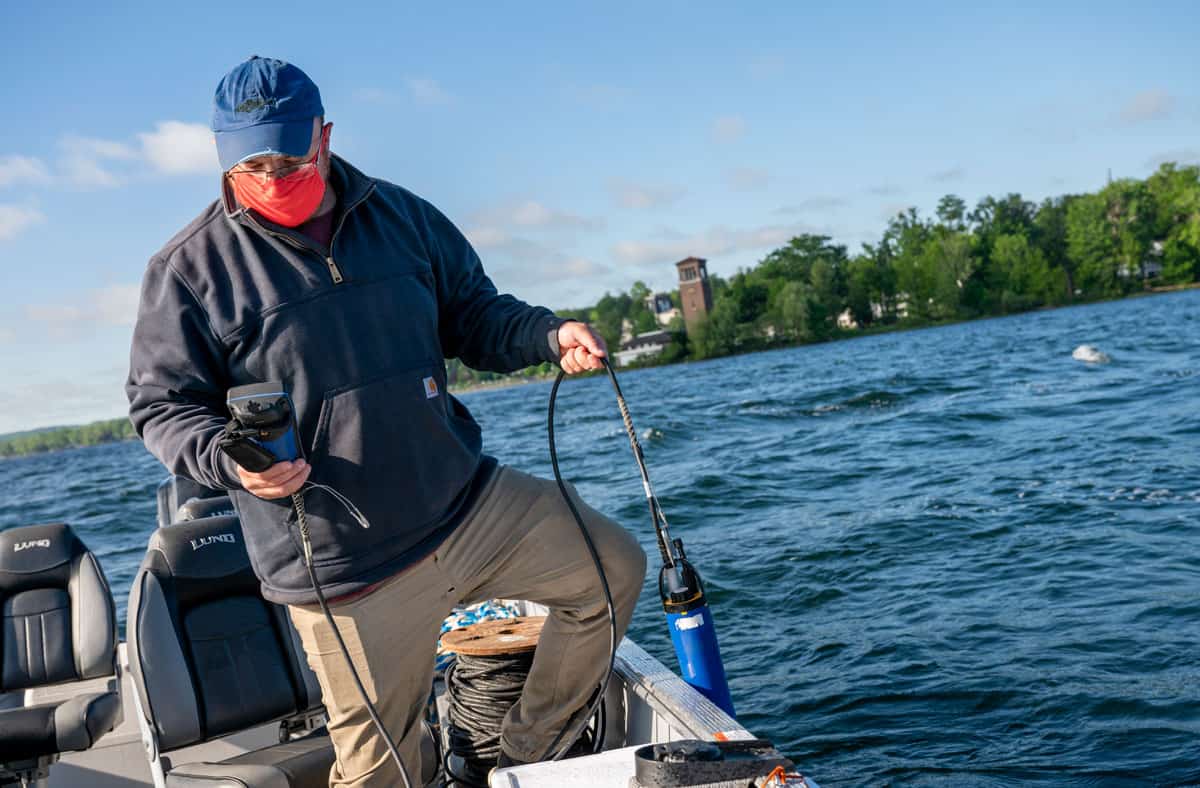Institution Invests $1 Million in Lake Science and Collaboration, Signs Memorandum of Understanding

CHAUTAUQUA, N.Y. — Chautauqua Institution today announced the investment of $1 million in research initiatives to support the continuing development of scientific knowledge of Chautauqua Lake ecology to inform the region’s comprehensive, science-based plan for lake conservation.
The investment will fund the 2021 work of The Jefferson Project, which launched a partnership with the region last year that resulted in new data and information about how lake water exchanges between the north and south basin. The next phase of work began in May, with researchers spending a week on the lake to collect samples that will be analyzed by Jefferson Project scientists to learn more about invasive species and the impact of mitigation efforts, including the use of herbicides.
A portion of the funds will also be allocated to establishing a year-round, full-time position on the Chautauqua staff to help manage the Institution’s governmental and constituent relations work with regard to lake issues.
Institution President Michael E. Hill said the investment is an indication of the Institution’s commitment to science-based solutions to lake conservation.
“Our Board of Trustees did not hesitate to advance this funding that we plan to raise as part of a fundraising initiative. Our strategic plan names the conservation of Chautauqua Lake among our four top strategic objectives over the next decade, and this investment is reflective of that priority and our commitment to the lake and the watershed that we call our home,” Hill said.
Under the leadership of Chautauqua County Executive P.J. Wendel, a public-private partnership will also contribute to the cost of this phase of The Jefferson Project’s work. Wendel also authored a new Memorandum of Understanding that all regional stakeholders have been asked to sign, including Chautauqua Institution.
“I signed the MOU on behalf of the Institution because I believe that collaboration is crucial to our chances of success in reversing the negative trends that are impacting Chautauqua Lake — placing it among the most stressed freshwater systems in the state,” Hill said. “There are several things we were hoping to see in the MOU that aren’t there, but we decided to not let the perfect be the enemy of the good. The region’s lake stakeholders need to continue talking, listening, and working together to save this lake.”
Dr. John E. Kelly, former executive vice president of IBM and a current Executive sponsor of The Jefferson Project, says this is an ideal partnership that will create both short- and long-term benefits.
“We believe that the Chautauqua Lake region is uniquely positioned to leverage the knowledge and resources of The Jefferson Project — both because of the existing foundation of knowledge and research on this fascinating ecosystem, and because of the region-wide commitment to solid science-informed solutions to the ills of the lake,” Kelly said. ”We look forward to creating and sharing additional scientific data and knowledge toward the improvement of Chautauqua Lake in both the short- and long-terms. And, we are grateful for the leadership, action and investments of Chautauqua Institution with the Chautauqua Lake and Watershed Management Alliance that are making this possible.”
The Jefferson Project was among four research teams that presented findings from recent research efforts at the Chautauqua Lake Quality Research Panel, sponsored by the Chautauqua Lake and Watershed Management Alliance (CLWMA) and hosted on the CHQ Assembly Virtual Porch in April. This program remains available for viewing on-demand.
Chautauqua Institution will be hosting information sessions throughout the summer for property owners and others who wish to know more about the Jefferson Project’s work on Chautauqua Lake and our lake conservation priority in general.
ABOUT THE JEFFERSON PROJECT
The Jefferson Project at Lake George — a partnership between Rensselaer Polytechnic Institute, IBM Research, and The Fund for Lake George — combines Internet of Things technology and powerful analytics with science to create a new model for environmental monitoring and prediction. The project is building a computing platform that captures and analyzes data from a network of sensors tracking water quality and movement. These sensor data are combined with other monitoring and experimental data to create a thorough understanding of the factors that drive the lake’s food web and overall water quality. Scientific insights and technology created for the project will not only help manage and protect one of America’s most famous lakes, but will create a blueprint to preserve important lakes, rivers and other bodies of fresh water around the globe.
Media Contacts
For Chautauqua Institution:
Jordan Steves, Director of Strategic Communications
716-357-6434 or jsteves@chq.org
For The Jefferson Project at Lake George:
John Brodt, Behan Communications, Inc.
518-260-6362 or John.brodt@behancom.com
Click or tap here to read The Jefferson Project’s tandem news release.
Save Your Trip
Fill out the form below to save your trip. You will receive a link to your saved list via email.
Save Your Favorites
Fill out the form below to save your favorites. You will receive a link to your favorites list via email.
"*" indicates required fields
Notice!
You have now entered the season. Some website content may differ depending on the current season we are in: Summer or Fall/Winter/Spring. You can toggle between the two season options at any time.